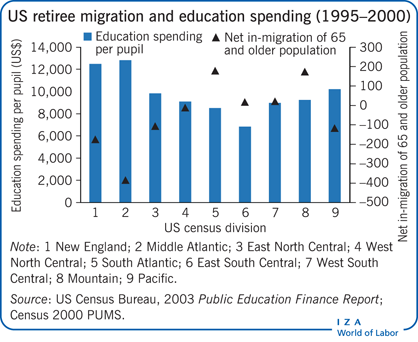Elevator pitch
With the aging of populations, particularly in more developed countries, retirees are becoming a politically influential group. Government budgets have been feeling the strain on social insurance, health care, and other programs that benefit the elderly. Yet spending on these programs has often come at the expense of other programs such as education, which benefit primarily the younger population. Attracting retirees has been viewed as an important avenue of economic development, with positive impacts on revenue and expenditure. However, it can also have a negative impact on education spending potentially resulting in intergenerational fiscal conflict.

Key findings
Pros
Retirees are relatively wealthy and can have a substantial economic and fiscal impact on local economies, relieving pressure on governments to finance programs and reducing intergenerational conflict over government spending priorities.
Retirees tend to locate in areas where education spending and taxes are already low, but they do not necessarily influence local policy making.
Some retirees are altruistic and contribute significantly to localities, particularly rural retirement destination communities, through volunteering and participating in education programs.
Cons
Retirees are active politically and influence fiscal policy making more directly at the state and local levels, which can result in policy decisions that lead to conflict with programs for the younger population.
Retirees, who see some indirect return to education at the local level, are less willing to support education at the state or province level, where they see less benefit.
Rising numbers of retirees boost social insurance and welfare expenditures, which take resources away from other government programs that benefit the young, such as education.